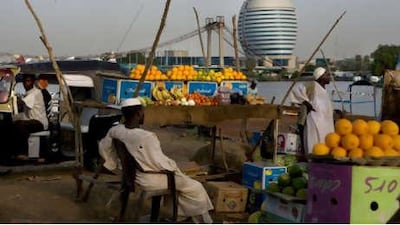Sudan's capital used to feel like something of a forgotten backwater, far from the main currents of African and Arab cultural life. It felt terribly relaxed and very friendly toward the few visitors who passed through, but you couldn't quite escape the feeling that not much ever happened there. A lot has changed in the short year since I started writing the Bradt Guide to Sudan. The city has become awash with oil money and new developments spring up every time I visit. Khartoum has confidently retaken its historical place as an important regional centre, and its fans even talk of it becoming something of an African Dubai. Khartoum is definitely open to visitors again. Here you can shop in Arab souqs in the morning, watch traditional African wrestling in the afternoon, finish off with a stroll along the Nile and the next day take a trip to Meroe, where you'll have a desert full of pyramids to yourself, without a camel-riding tout or souvenir seller in sight.
Khartoum's sleepy reputation never used to extend far if you wanted to actually rest your head in comfort, but the recent oil-boom years have expanded the hotel scene considerably, and these days you won't be short of options.
The glitziest option is the billowing sail-shaped Burj al-Fateh (www.burjalfateh.com), near the Nile confluence. Double rooms cost from US$453 (Dh1,670), including breakfast and taxes. Just down the road, along the Nile Corniche, is the Grand Holiday Villa (www.holidayvillakhartoum.com), a beautifully restored colonial-era building; make sure you ask for a room with a river view. Doubles here start from $310 (Dh1,140) including breakfast and taxes.
Popular with journalists, aid workers and archaeologists, the Acropole (www.acropolekhartoum.com) is Khartoum's oldest hotel. A full-board double, including tax, costs $235 (Dh865). For something more homely, try the Bougainvilla Guesthouse in the upscale Riyadh district (www.bougainvillaguesthouse.com) where a double, including breakfast and taxes, costs from $126 (Dh463).
The first fact to get your head around is that Khartoum isn't really one city but three, trisected by the confluence of the Nile: Khartoum proper, the old city of Omdurman on the west bank, and Khartoum North. Downtown Khartoum is easy to navigate, being mostly gridded, although the central street plan was originally laid out by the British in the shape of the Union Jack. The airport is relatively close to downtown Khartoum, but a larger replacement airport some 40km southwest of Omdurman is due to open later this year. Yellow taxis are plentiful and preferable to getting behind the wheel yourself. Most people only hire cars if they're making excursions out of the city, such as to the pyramids of Meroe, but most hire places prefer you to take a vehicle with a driver - and there's little added expense in doing this.
If you want to get to know the Sudanese, the best time is during the most important meal of the day - breakfast. Taken mid-morning, breakfast is a Sudanese institution, and always worth interrupting the working day for. Big bowls of foul are enlivened with salad, cheese and egg, and scooped up with bread to an accompaniment of conversation. Coffee can be served after, but it's fun to visit the coffee stalls you'll find on almost any street corner. Run by women, they often consist of little more than a brazier and a chest covered in jars of tea, coffee and spices, with stools (or old cooking oil cans) providing the seating. They're a great place to watch the world go by over a drink, while the stallholder holds court over a never-ending routine of kettle juggling, coffee pounding and fire stoking. For conversation, politics can often be controversial, particularly anything to do with Darfur or the 2011 referendum on southern independence.
The best Sudanese food blends Arab and African influences. Fish often comes high up on the menu - understandable given that Khartoum sits astride Africa's mightiest river. Sudan Toukoll in Khartoum 2 district is one of my favourite places for good Sudanese food. It's an unpretentious place with a simple seating area and swooping ceiling fans, but you can get great plates of weka (stewed okra), adis (lentils), fried fish and sheya (meat barbequed directly on hot coals). Mains cost around $3 (Dh11). Khartoum 2, and the nearby District of Riyadh, is where you'll find the best variety of restaurants, including some decent Italian, Indian and Chinese restaurants. If you're dining to impress, look no further than the Al Mogran Restaurant at the Burj al-Fateh, where you can enjoy your meal while taking in a spectacular bird's-eye view of Khartoum. Expect to pay from $45 (Dh165) for dinner.
You can find almost anything on sale in Omdurman's endlessly sprawling souq, from traditional clothes to wood carvings, mixed in with mountains of cheap Chinese goods. You can find a wider array of Sudanese souvenirs at Dabanga (Street 15, Emarat; 00 249 183 471145), from small trinkets to large artworks.
Khartoum enjoys a reputation as one of the safest capital cities in Africa. Be careful where you point your camera however - photography of anything that might be judged military or strategic is strictly forbidden. This includes the spectacular view of the Nile confluence from the bridge to Omdurman.
Khartoum's own "whirling dervishes" gather at the tomb of the Sufi Sheikh Hamed al Nil every Friday just before sunset. The adherents dress in green patchwork robes topped with leopard skin, beads and dreadlocks. To an accompaniment of drums and cymbals, they whirl in circles, whipping themselves into a divine frenzy. The National Museum and the Ethnographic Museum in Khartoum are both worth visiting. The former is full of ancient Nubian artifacts, including an intact temple rescued from the floods of Lake Nasser when the Aswan Dam was built - a similar fate which befell Egypt's Abu Simbel. travel@thenational.ae

